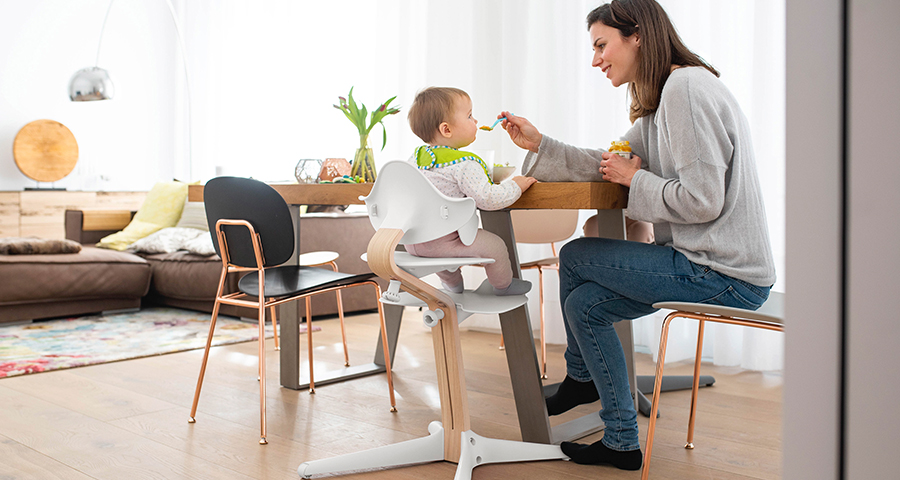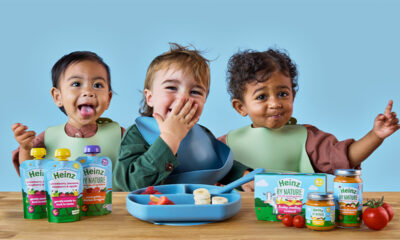Advice
Best Foods For Weaning Your Baby


Features / 13 May, 2024 / Dr Helen Lawal
What is ‘weaning’?
Weaning is introducing your baby to solid foods, alongside breastmilk, or infant formula, starting when your baby is around 6 months old.
It’s a crucial milestone within the first 1,001 critical days of their development as it teaches babies to move food around their mouth, chew and swallow, and influences? children’s eating habits and health later in life.
Beginning the weaning journey with your little one is a really exciting and wonderful time. But research from the Start for Life Introducing Solid Foods campaign shows that half of parents (50%) in England feel overwhelmed (55%) and confused (46%) by all the conflicting information out there on how much to feed their baby, and what age to start weaning (47%).
The research also found that nearly half (46%) of parents believed that solid foods should be introduced at around five months or earlier, meaning too many babies are being weaned onto solid foods at the wrong time.
However, help is at hand you feel more confident and supported when embarking on your weaning journey. The Better Health Start for Life Weaning Hub is packed with NHS advice and has everything you need to know in one place.
Above all, this should be an exciting time. It’s an opportunity for your baby to experience the adventure of trying new flavours and for you both to enjoy mealtimes together.

When to start?
With so much conflicting advice, whether it be from sources online, or family and friends, it can be tricky to know exactly when to start weaning your baby. The research showed that nearly half of parents are also influenced by behaviours that can be mistaken as signs their baby is ready, such as seeing their baby grabbing food (47%) or looking at food (43%).
But NHS guidance recommends weaning from around 6 months old – and there are three key sigs to look out for that can help you spot when your baby is ready to begin trying solid foods.
At this age, they should be able to:
- Sit up and hold their head steady
- Coordinate their eyes, hands and mouth so they can look at their food, pick it up and put it in their mouth
- Swallow food, rather than push it back out
Why is it important to wait?
It is so important to wait until your baby is ready before weaning them on to solid foods, especially as for the first six months of their lives, breastmilk and instant formula will provide everything that babies need for healthy growth. It is only around this age when they will start to need solid foods to meet their nutritional needs.
Waiting until they are 6 months old will mean your baby is able to cope with the moving food around their mouth, chewing the right amount, and swallowing it properly. Also, they’ll be more capable to lead the weaning process, exploring all the food on offer for themselves, and beginning to eat their meals independently.
What are great first foods?
When you start out on your weaning journey, your baby will only need a very small amount of solid food – so you can start slowly, by introducing solids once a day, at a time which suits you both. Single fruits or vegetables are a good place to start.
Soft foods, such as banana or avocado, which can be easily mashed and scooped with a spoon are recommended to help babies practice their self-feeding skills. These are great options as their sticky texture makes them good for scooping and are packed full of nutrients – you can even mash and mix them together!
What to offer your baby at 7-9 months old?
You can then begin to add more healthy fats and protein into their diet. To ensure they are getting sufficient nutrients for their development, try feeding your baby nutrient rich foods such as avocado, fish, eggs, and cheese.
Remember, it may take 10 tries or even more for your baby to get used to new foods, flavours, and textures. Don’t worry – this is very normal. Be patient, keep offering a good variety and let them get used to it in their own time.
In terms of allergies, make sure your little one has a try of those foods which could potentially trigger allergic reactions – such as: milk, gluten, nuts, seeds, soya and fish. Of course, make sure to do so gradually, and carefully. Try different ingredients one at a time, in small amounts so that you can spot any reactions straight away. Induction of allergenic foods should not be delayed beyond 12 months, as this may consequentially increase the risk of allergy.
Signs of a food allergy can include one or more of the following reactions:
- diarrhoea or vomiting
- a cough
- wheezing and shortness of breath
- itchy throat and tongue
- itchy skin or rash
- swollen lips and throat
- runny or blocked nose
- sore, red and itchy eyes
In a few cases, foods can cause a severe allergic food reaction, which can be very dangerous. Call 999 and get medical help immediately.
For more information, have a look at food allergies in babies and young children on the Start for Life website.
What to think about at mealtimes?
The Better Health Start for Life Weaning Hub is packed with NHS-endorsed mealtime watchouts, such as choking hazards and ways to prepare food safety.
Remember to always stay close and keep watching to your baby during meals to make sure you can help them if they try to consume more food than their body is ready for. Start for Life’s main advice to prevent choking is to wait until your baby is 6 months old to begin weaning, and to feed them the right portion at the right time. Keep exploring their hunger signals and never force them to eat. Allow them to go at their own pace, to handle the food and start to feed themselves when they’re ready.
Make sure you allow the food to cool and then test it yourself to make sure it’s the right temperature before giving it to your baby.
Meal ideas: Start for Life Weaning Hub!
If you are beginning your weaning journey and need some meal ideas, The Better Health Start for Life Weaning Hub has so many recipes for you to choose from and experiment with! For babies ranging from six months all the way to 12 months, and beyond, there are recipes to suit everyone!
Visit the website for more information on the when, why, and what of weaning, top tips and plenty of delicious recipes to explore! Some of the recipes we love at My Baba include:
Breakfast for 7-9 months:
Egg and mushroom cups
Serves: 8 portions
Prep time: 5 to 10 mins
Cooking time: 10 to 15 mins
Suitable for vegetarians: Yes
Eggs, mushrooms and parsley oven baked and served with toast and tomatoes. This quick and easy recipe can be enjoyed for breakfast or lunch.
Ingredients
- 5 medium eggs
- 4-5 mushrooms
- 5g parsley (1 tbsp, chopped)
- 3 cherry tomatoes (1 portion)
- 1 small slide wholemeal bread (1 portion)
- 1 tsp vegetable oil spread (1 portion)

Method
- Preheat the oven to 180°C / 360°F / Gas Mark 4.
- Beat the egg. Roughly chop the mushrooms and parsley.
- Add the mushrooms to the beaten egg, then divide mixture evenly between 8 non-stick (or lightly oiled) muffin tray holes.
- Sprinkle each cup with parsley.
- Bake for 10 to 15 minutes, or until golden, and the eggs are cooked through (not runny).
- Meanwhile, put 2 tbsp water and the quartered cherry tomatoes in a small saucepan. Heat gently for 2 to 3 minutes, stirring often, until the tomatoes are soft (if the tomatoes start sticking, add a little water). Then set aside.
- Turn the breakfast cups onto a rack and allow to cool a little.
- Toast the bread, spread with vegetable spread, then cut into fingers.
- Serve one breakfast cup with the toast, mashed tomatoes and a spoon.
Main (savoury) for around 6+ months:
Butterbean goulash with cooked green beans
Age: 6+ months
Serves: 25 portions (approx.)
Prep time: 10 mins
Cooking time: 35 mins
Suitable for vegetarians: Yes
A tasty butterbean dip (puree) with cooked, soft green beans! This recipe makes enough for the whole family to enjoy together, or you can freeze in smaller portions for a handy meal on busy days.
Ingredients
- 1 small onion, peeled
- Half medium green pepper, deseeded
- 2 mushrooms
- Half medium carrot, peeled
- 1 clove garlic, peeled
- 1 tsp vegetable oil
- 1 can butterbeans, no added salt or sugar, drained (240g)
- Half tbsp paprika
- 1 can chopped tomatoes (400g)
- 150ml water
- 25g (1 heaped tbsp) green beans, washed and ends trimmed

Method
- Chop the vegetables and the garlic.
- Heat the oil in a pan and add in the onions. Cook for a few minutes.
- Add the pepper, mushrooms, carrot, garlic, beans, paprika, canned tomatoes, and water – stir well. Cover and simmer for 30 minutes, stirring occasionally.
- In the meantime, steam or boil the green beans for 5 to 6 minutes until soft.
- Once cooled a little, blend or mash the goulash until smooth (but with soft lumps). Serve with the green beans as a finger food.
Snacks for 12+ months:
Cheesy English muffins & cucumber sticks
Serves: 2 portions
Prep time: 5 mins
Cooking time: 2 mins
Suitable for vegetarians? Yes
Toasted English muffins with a tasty layer of cream cheese and cucumber sticks on the side – a perfect mid-afternoon snack for your baby.
Ingredients
- 4 thick cucumber finger sticks, washed & halved lengthways
- 1 English muffin, halved
- 30g full-fat cream cheese

Method
- Toast or grill the muffin until golden brown, then spread the cream cheese evenly.
- Serve with the cucumber sticks.
- Any leftover cucumber will make a great snack for older children and other members of the family too.
Images: Start For Life, Weaning Hub.
Article by Dr Helen Lawal.
Dr Helen Lawal is a Doctor, TV Presenter, Health Coach and mother specialising in Women’s Health, Lifestyle and Nutrition. Helen brings both a medical and personal perspective as a mother who has experienced the weaning journey.
Read Next
Letting Go Of The Dummy: Timing And Tactics For Transitioning Away
Empowering Parenthood: How Community Pharmacists Offer Support And Guidance
-

 Destination8 months ago
Destination8 months agoSingapore Airlines CEO set to join board of Air India, BA News, BA
-

 Breaking News10 months ago
Breaking News10 months agoCroatia to reintroduce compulsory military draft as regional tensions soar
-

 Gadgets3 months ago
Gadgets3 months agoSupernatural Season 16 Revival News, Cast, Plot and Release Date
-

 Tech News12 months ago
Tech News12 months agoBangladeshi police agents accused of selling citizens’ personal information on Telegram
-

 Productivity11 months ago
Productivity11 months agoHow Your Contact Center Can Become A Customer Engagement Center
-

 Gadgets3 weeks ago
Gadgets3 weeks agoFallout Season 2 Potential Release Date, Cast, Plot and News
-

 Breaking News10 months ago
Breaking News10 months agoBangladesh crisis: Refaat Ahmed sworn in as Bangladesh’s new chief justice
-

 Toys12 months ago
Toys12 months ago15 of the Best Trike & Tricycles Mums Recommend























